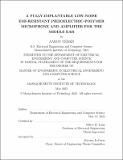A Fully-Implantable Low-Noise Emi-Resistant Piezoelectric-Polymer Microphone and Amplifier for the Middle Ear
Author(s)
Yeiser, Aaron
DownloadThesis PDF (19.01Mb)
Advisor
Lang, Jeffrey H.
Terms of use
Metadata
Show full item recordAbstract
We present a fully implantable piezoelectric microphone designed to operate with a cochlear implant. This thesis details the design, fabrication, and potential surgical implantation scheme for a fully differential and shielded cantilever made from polyvinylidene difluoride (PVDF)—a common piezoelectric polymer, as well as a low noise differential charge amplifier designed for small capacitance sensors. The amplifier and sensor combination has a noise floor of 385 e− (0.062 fC) over its bandwidth of 100 Hz to 20 kHz, equivalent to 0.015 nm of displacement. When implanted, we achieve a pressure sensitivity of 80–100 fC/Pa referenced to ear canal pressure below 2 kHz and 8–10 fC/Pa above 4 kHz. We expect this sensitivity at high frequency to substantially improve when measured relative to free-field sound pressure, as the horn-like outer ear and ear canal provide up to 20 dB pressure gain above 1 kHz. Our design also provides significant EMI protection—we measured a sensitivity to external electric potentials of only 0.6 fF compared to over 200 fF for an unshielded 4 mm-diameter sphere. We believe this microphone design is competitive with commercial electret microphones used for cochlear implants, especially since our design is fully implantable and interfaces with the existing middle ear structures.
Date issued
2022-05Department
Massachusetts Institute of Technology. Department of Electrical Engineering and Computer SciencePublisher
Massachusetts Institute of Technology